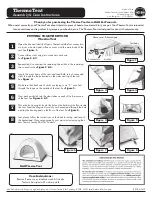
Thank you for purchasing your Lodge 200 Motor from SunnCamp. Please read and follow these instructions carefully.
If there is anything you do not understand, please contact your supply retailer for advice.
Flysheet
1
Poles Shock Corded Black
2
Tent Peg Bag
1
Figure of 8 (approx 67cm each)
3
Tent Carry-Bag
1
It is a requirement of the warranty that you unpack and erect this awning at home prior to proper use. This will enable you to familiarise yourself with the awning and
cheek all parts are present and in good condition. If you find a part missing or a fault with your awning, contact your SunnCamp stockist for advice.
SITE SELECTION
Choose a location where the ground is flat,
smooth and dry. Attempt to position the awning
entrance away from the directions of any wind.
Do not position on sharp, rocky or rough
ground.
GETTING STARTED
Unpack the awning and place the carry-bag
somewhere safe. Separate all components and
cheek that everything is present.
POLES
Take each Shock Corded Pole and slot
together. The poles are folded down to aid
storage. When fitting the pole sections together,
make sure that the pole body is fully inserted
into its adjusting ferrule.
AWNING
Lay the awning on the selected ground area
with the entrance correctly positioned.
Insert each shock corded pole into a sleeve.
There are two sets of plastic pole clips on each
leg which should now be secured to the poles to
help to bring the tent flysheet into the correct
shape. Each pole end is held captive by a pin
on a ring fitted to the end of a webbing strap.
The ring is also used as the securing point for
the awning peg. Starting with one of the poles,
insert the ring pin into the end of the pole. Next,
go to each of the other four corners and insert
the ring pin into the pole ends to bring the pole
under tension and the awning to an upright
position.
ENTRANCE
You should now ensure that all entrances to the
awning are closed with all zips fully secured. If
this is not done now, the awning will be out of
alignment when fitting the awning pegs.
AWNING PEGS
Secure the flysheet to the ground by inserting
awning pegs through the pegging points.
When inserting into the ground, the peg should
be set at a 45 degree angle away from the
awning. Pegs should be hammered into the
ground using a suitable mallet and NOT
pressed in with the foot. All guylines must also
be pegged out securely at all times.
REAR ENTRANCE
The awning has a rear entrance which should
be closed whenever your motorhome /
campervan is driven away.
SAFETY
It is advisable to have a ‘Fire’ bucket filled with
water, placed outside the awning.
Hopefully it will never be needed, but if it is, you
will be glad you made the effort.
The awning fabric is fire retardant, NOT fire
proof and therefore you must not smoke or use
a naked flame in or near it. This includes the
traditional ‘camp fire’.
Guy ropes can cause a trip hazard and should
be marked so that passers by can see them.
Awning pegs are also a trip hazard and should
not be left ‘half in’.
CLEANING, STORAGE AND REPAIRS
Cleaning…
Both inside and outside of the awning should
only be cleaned using fresh clean water and a
damp cloth. Do not use detergents or chemical
cleaners.
Storing…
The awning is best stored in its original carry-
bag. However, if the awning is dismantled when
wet, you MUST thoroughly dry the awning as
soon as possible. After a wet pack-up, erect the
awning as soon as possible and allow its
flysheet, guy ropes and of course the carry-bag
to fully dry naturally before repacking everything
away. If stored when the flysheet and / or guy
ropes are wet, the awning will suffer from
mildew and will become unusable. Please note
that damage caused by incorrect storage is
NOT covered by the manufacturer’s warranty.
The valves body should be left unscrewed from
the air tubes when packing away the awning.
Please refer to the section headed VALVES.
Repairs…
Repairs to the awning should only be made by
the manufacturer’s recommended agents.
Repairs made by an unauthorised third party
will make the manufacturer’s warranty void.
UV DETERIORATION
Prolonged exposure to direct sunlight can
weaken the fabric of the awning. To avoid the
risk of UV deterioration, site the awning in a
shaded area, where it will be protected from
exposure to strong sunlight.
MOISTURE
Moisture collecting on the inside of the awning’s
fabric is condensation caused by the occupier;
It is NOT a sign of leakage.
Note that damage caused by condensation, is
NOT covered by the manufacturer’s warranty.
SAFETY WARNING: BBQ’S/GAS
APPLIANCES
Your tent has a sewn in label warning against
CARBON MONOXIDE POISONING. Please be
aware of carbon monoxide poisoning and do
not under any circumstances use or leave a
used BBQ (even if you think it is still not
burning) in your awning or tent.
DISMANTLING
To dismantle the awning, simply reverse the
erection procedure.
Do make sure that the entrance is left open to
allow air to escape when rolling the fly sheet up.
All poles must be dismantled and the awning
should be carefully rolled prior to placing back
in the carry-bag.
STORM AND WEATHER SUITABILITY
This awning is designed for light use in normal
weather conditions. It is not suitable for storms,
gales, sub zero or tropical conditions.
WARRANTY
Please refer to the separate warranty sheet that
is enclosed with your Tent/Awning.




















